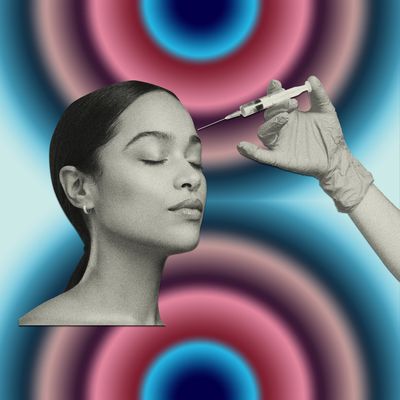
In the 20 years since the FDA approved botulinum toxin type A (aka Botox Cosmetic) for wrinkles, the question of whether or not to partake has become unavoidable. With treatment costs going down and the stigma dissipating, more people than ever are getting needled. According to the International Society of Aesthetic Plastic Surgery, neurotoxin injections are the most popular minimally invasive cosmetic procedure, and the number of people getting those procedures rose 26 percent between 2016 and 2020 — a time period that doesn’t even account for the plastic surgery Zoom boom. These days, celebrities are shilling wrinkle injections, and Botox bars are all over the place.
You know what else is everywhere? Your face! It’s impossible to avoid. Meetings, mirrors, phones, photos. Even if you believe “getting older is hot,” the fact that you have to say so — to yourself or others — is evidence that our society forces people to contemplate the way they look as they age and, at some point, come up with a “strategy.” Rather than debate the injustice of it all, let me see if I can help you on a practical level.
First, look in a mirror and try to identify the skin concern that bothers you the most. Seriously. I know that scrutinizing your face can be an emotional experience, but the naming of the thing is important. In my experience — having gone through this process with dozens of friends (and dozens more strangers at parties after they learn I’m a beauty editor) — most people who say they’re concerned about signs of aging have never taken the time to identify exactly what’s bothering them. They just think they look older. (Inevitable! And not a bad thing if you like the way you look!) Or they’re worried all their friends are getting anti-aging treatments and they don’t want to be left behind. But once you do this exercise, you may realize you like the way your face looks. Or you’ll identify an issue that has nothing to do with aging, like acne scars or under-eye circles. And there’s no point in getting a treatment to fix a concern you don’t have or that’s secondary to another issue.
“People come to see me for all sorts of skin issues, but Botox only helps with a particular set of concerns,” says David J. Goldberg, M.D., a dermatologist at Schweiger Dermatology Group in New Jersey and New York. If you’ve named your concern and it’s shallow lines across your forehead or between your eyebrows, or crow’s-feet that are noticeable when you smile, Botox can help. (FYI: Botox Cosmetic is just one specific brand of prescription injectable in an entire category of cosmetic neurotoxins, or neuromodulators, that also includes Jeuveau, Xeomin, Dysport, and Daxxify.) In general, these types of injections temporarily freeze your facial muscles for three to six months, which relaxes and softens the appearance of the lines. Goldberg says Botox can’t correct deep creases or lines that are etched in when your face is at rest, nor can it help with lines around your mouth (“That’s when we talk about filler,” he says), textured lines on your cheeks (“laser time”), or sagginess.
According to Goldberg, neurotoxins may help to stave off future wrinkles. For example, in one 19-year study of a pair of identical twins — one who got injections, one who didn’t — the ’toxed twin developed fewer wrinkles. “I’ve been injecting for 20 years, and prejuvenation is real,” he says. “If you start younger, your muscle tone is solid, you need less, and you don’t need it as often.” That’s important to note, because money should absolutely factor into your decision. Treating one small area with neurotoxin costs, at a bare minimum, $250, but probably more like $500 to $750, depending on who your provider is.
On that note, if it’s your first time considering minimally invasive cosmetic treatments, I suggest you go to a doctor who is board certified in dermatology or plastic surgery. Book a consultation to start; it typically costs $150 to $200, but most doctors will deduct the fee from the cost of any cosmetic procedure you decide to get. Then, if you like the doctor and they suggest Botox, get it from them. Other types of doctors can give injections, and some states also allow nurses and physician’s assistants to do so. But if it’s your first time, it’s worth going to a doctor who specializes in aesthetics and whom you trust and like.
From my personal experience, the provider really matters. I started getting ’tox from a well-known doctor 15 years ago, when I was 29, and I stopped about three years after that because I thought my brows were getting lower. My forehead just looked blocky and heavy. So I skipped the appointments for a year, and when my lines started to come back, I went to a different doctor (Heidi Waldorf, M.D.). The results were much more natural-looking, and I’ve been seeing her ever since. I’ve also been going less frequently as I’ve gotten older. I just think there’s something uncanny valley–ish about an experienced woman who looks preternaturally young — I’ve had some fun and I feel like my face should reflect that. I can even imagine a time when I stop getting injections altogether. But let’s not get ahead of ourselves.
Jennifer Sullivan answers all your beauty-related questions with practical advice and zero judgment. Send your questions to [email protected]. (By emailing, you agree to the terms here.)


